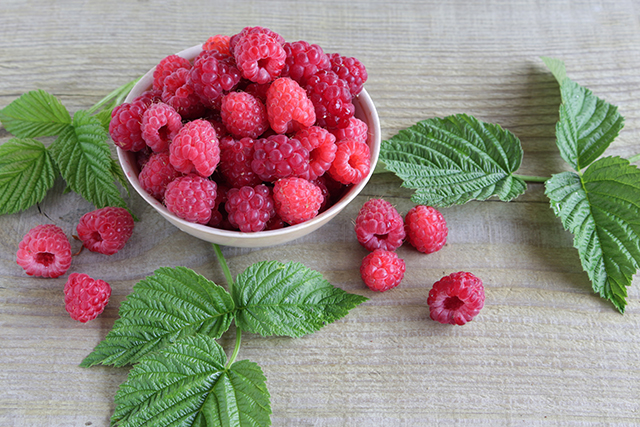Learn about brain health and nootropics to boost brain function
Phenolic-enriched raspberry extract can decrease weight gain – even when eating a high-fat diet

( Natural News ) There are many health benefits associated with eating raspberries ( Rubus idaeus ). These brightly colored fruits from the rose family are rich in essential nutrients and compounds that boost brain, heart and eye health and help with various health problems, such as diabetes, cancer and digestive issues.
Notable micronutrients that can be found in raspberries include vitamins B9 (folate), C, E and K, and minerals like calcium, magnesium, phosphorus and potassium. Raspberries are also rich in antioxidants, such as the carotenoids alpha- and beta-carotene, lutein, lycopene and zeaxanthin.
When it comes to macronutrients, raspberries are rich in protein and fiber, both of which promote satiety and reduce food intake. These nutrients are very helpful for people who are aiming to lose weight.
But researchers at Rutgers University in New Jersey have recently found that those nutrients are not the only reasons for raspberries’ ability to fight obesity. In their new study, they showed that raspberry extracts, which contain phenolic compounds, can prevent excessive fat accumulation and weight gain caused by a high-fat diet. They discussed their findings in an article published in the journal Nutrition Research . Why raspberries should be part of an anti-obesity diet
Among the numerous compounds found in raspberries , phenolic compounds are some of the most useful to humans. Besides possessing properties that promote human health, phenolic compounds also give fruits like raspberries their sweet flavor and pleasant scent.
Raspberrry ketone, 4-(4-hydroxyphenyl)-2-butanone, is a phenolic compound commonly used as a food flavoring. Despite being designated as a “synthetic” flavoring agent by the U.S. Food and Drug Administration (FDA), raspberry ketone is naturally occurring and has beneficial properties. For instance, research in rodents suggests that regular consumption of raspberry ketones leads to weight loss.
To find out if raspberry fruit extracts, which are also rich in phenolics, can do the same, the Rutgers team decided to place four groups of mice on a high-fat diet for a month. Together with foods that contain 45 percent fat, the researchers also gave each group either a control containing only water, propylene glycol and dimethyl sulfoxide; low doses of raspberry extract (REL); high doses of raspberry extract (REH); or raspberry ketone (RK).
After four weeks, the researchers reported that both REH and RK reduced body weight gain and fat mass compared with the control. REH also increased the expression of heme oxygenase-1 (HO-1) and lipoprotein lipase, two enzymes whose activities are crucial to preventing obesity.
According to studies, HO-1 has antioxidant and anti-inflammatory properties that help reduce oxidative and inflammatory stress — two factors involved in the development of obesity and other metabolic diseases. Lipoprotein lipase, meanwhile, plays a critical role in breaking down fat (triglycerides) inside the body.
The researchers also found through indirect calorimetry that REL, REH and RK all reduced the respiratory exchange ratio — that is, the ratio between carbon dioxide production to oxygen consumption — in mice, suggesting increased fat oxidation. Fat oxidation refers to the process by which the body “burns” fat for use as energy. (Related: 6 Natural ways to burn fat if you can’t exercise regularly .)
REH also increased total ambulatory (walking) behavior and energy expenditure/lean mass in mice compared with REL, indicating increased physical activity. None of the treatments, however, caused differences in cumulative food intake, meal patterns or hypothalamic feed-related gene expression.
Based on these findings, the researchers concluded that raspberry ketone and phenolic-rich raspberry extracts can prevent weight gain via different mechanisms that stop excess fat accumulation caused by a high-fat diet.
Sources include:
Read more at www.naturalnews.com